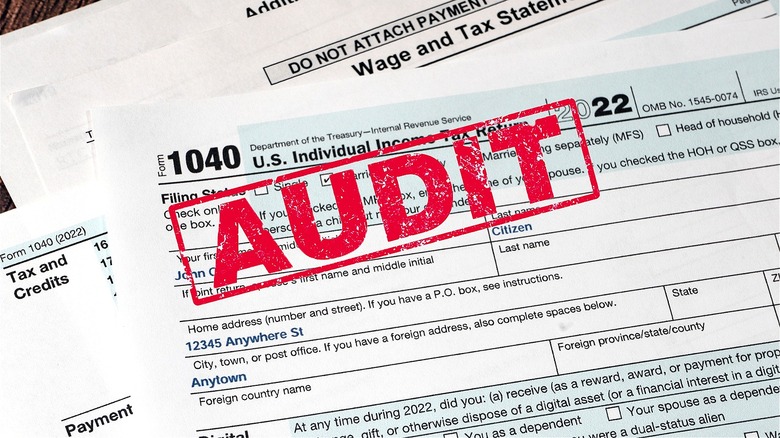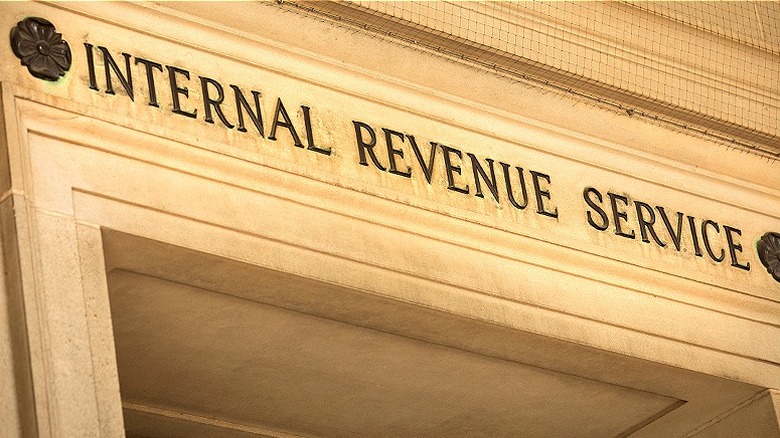What Actually Happens When You Get Audited By The IRS
There's no denying that feeling of relief once you e-file or mail in your federal income tax return. Whether you're expecting a fat refund or wound up owing Uncle Sam some money instead, at least the annual ritual that no American looks forward to is in the proverbial rearview mirror. Or is it? What if a dreaded letter arrives weeks, months, or even years later? Oh no, you're being audited.
Before having an emotional meltdown, verify you are in fact the target of an audit. Sometimes, the IRS will catch mathematical errors on your tax return and send out a correction notice, which could be in your monetary favor — or not. If you agree with the contents of the notice, there's little to do except remit the extra payment amount, if applicable. If you disagree, the letter will explain the process and timeline to dispute the findings.
Similarly, the IRS may pick up on a discrepancy between the information you provided on your federal tax return and the information that's provided to the revenue service automatically by your employer, financial institutions, and others. For example, the IRS could receive a copy of a FORM 1099 for self-employment that wasn't mentioned on your tax return. Such mismatches will trigger a CP2000 notice from the IRS, along with its proposed changes to your overall credits or payments. Once again, you can agree with or dispute the findings within a certain deadline. As unnerving as these notices may be initially, they're not technically an IRS audit and can be rectified with little fanfare or concern.
The odds of being audited are low
Unlike a correction notice or CP2000 underreporter inquiry that can simply be agreed with and disappear, an audit is definitely going to require you to provide additional records or clarity to the IRS. To be clear, don't automatically assume the IRS thinks you're lying or intentionally trying to deceive. Instead, view an audit from the perspective that your tax return stood out from similar returns for some reason and the IRS wants to verify why.
Tax experts would agree that filing a tax return that includes an excessive amount of itemized deductions is one red flag that could get you audited. Another big red flag is if you're a business owner who's reported lower profit ratios than other businesses operating in a similar industry.
According to Syracuse University's Transactional Records Access Clearinghouse, a nonprofit data gathering, research, and distribution organization, the odds of being audited for the fiscal year 2022 were just 0.38% for average earners (up to $500,000 in income). To put that into perspective, that's 3.8 out of every 1,000 returns that will be audited. That number jumps to a 2.38% chance for workers who earned over $1 million in FY 2022. Surprisingly, low-income earners — defined as less than $25,000 annually — are also at an elevated risk, with 1.27% of returns getting audited.
More than 75% of audits are resolved by mail
The good news, if there's such a thing, surrounding an audit is that most inquiries can be resolved by mail. In fact, more than 75% of all audits are so-called "mail audits." That sensationalized Hollywood portrayal of unannounced IRS agents knocking at your door and confiscating bankers boxes full of paperwork is, in most cases, a gross exaggeration.
Instead, the IRS will let you know what documents it requires and a deadline by which to provide them. Once you've responded in a timely fashion, the revenue service will then let you know if the provided documentation was sufficient to resolve the issue, or whether it needs additional records. Typically, most audits are completed within three to six months.
Audits that can't be resolved by mail are called office or field audits and are typically more serious. Indeed, it's been said that most tax evasion cases begin with a field audit. During a field audit, IRS agents may put your lifestyle and other personal details under a microscope. In the fiscal year 2023, the IRS prosecuted approximately 2,600 tax evasion cases, according to the agency. Though experts note that the consequences are mostly financial, few dishonest filers actually go to prison — though it's possible in severe instances.
Don't hesitate to enlist professional help with your audit
Hopefully, you won't ever be involved in an audit, but if you are, know that it's typically more of an inquisitive process rather than an accusatory one. To stay at the ready, experts recommend keeping a flawless set of records. For instance, business owners won't only want to retain invoices, but also copies of the method of payment used to pay said invoices. Ditto for charitable donations, gambling losses, medical expenses, and other itemized deductions that may be larger than typical for most tax filers. In general, most taxpayers in the United States are advised to hang on to their tax returns (and supporting documents) for at least three years.
Also, be sure to meet the IRS' deadlines when it comes to responding to the audit and only provide what's strictly necessary to answer its specific inquiry. Providing additional, unsolicited information or commentary can unintentionally broaden the revenue service's review. Finally, don't hesitate to enlist the help of a certified public accountant or other tax professional.
If you received help preparing your tax return, contact that party right away once you receive any correspondence from the IRS. Many online tax preparers, such as TurboTax or H&R Block (research which is better for you), offer varying degrees of audit protection, depending on what service was selected at the onset.



